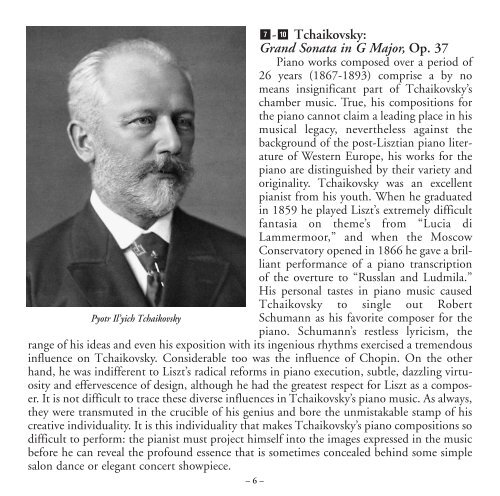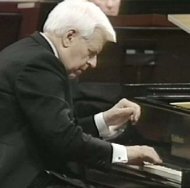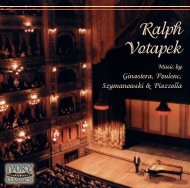70904 for PDF 11/05 - Ivory Classics
70904 for PDF 11/05 - Ivory Classics
70904 for PDF 11/05 - Ivory Classics
You also want an ePaper? Increase the reach of your titles
YUMPU automatically turns print PDFs into web optimized ePapers that Google loves.
7 - 10 Tchaikovsky:<br />
Grand Sonata in G Major, Op. 37<br />
Piano works composed over a period of<br />
26 years (1867-1893) comprise a by no<br />
means insignificant part of Tchaikovsky’s<br />
chamber music. True, his compositions <strong>for</strong><br />
the piano cannot claim a leading place in his<br />
musical legacy, nevertheless against the<br />
background of the post-Lisztian piano literature<br />
of Western Europe, his works <strong>for</strong> the<br />
piano are distinguished by their variety and<br />
originality. Tchaikovsky was an excellent<br />
pianist from his youth. When he graduated<br />
in 1859 he played Liszt’s extremely difficult<br />
fantasia on theme’s from “Lucia di<br />
Lammermoor,” and when the Moscow<br />
Conservatory opened in 1866 he gave a brilliant<br />
per<strong>for</strong>mance of a piano transcription<br />
of the overture to “Russlan and Ludmila.”<br />
His personal tastes in piano music caused<br />
Tchaikovsky to single out Robert<br />
Pyotr Il’yich Tchaikovsky<br />
Schumann as his favorite composer <strong>for</strong> the<br />
piano. Schumann’s restless lyricism, the<br />
range of his ideas and even his exposition with its ingenious rhythms exercised a tremendous<br />
influence on Tchaikovsky. Considerable too was the influence of Chopin. On the other<br />
hand, he was indifferent to Liszt’s radical re<strong>for</strong>ms in piano execution, subtle, dazzling virtuosity<br />
and effervescence of design, although he had the greatest respect <strong>for</strong> Liszt as a composer.<br />
It is not difficult to trace these diverse influences in Tchaikovsky’s piano music. As always,<br />
they were transmuted in the crucible of his genius and bore the unmistakable stamp of his<br />
creative individuality. It is this individuality that makes Tchaikovsky’s piano compositions so<br />
difficult to per<strong>for</strong>m: the pianist must project himself into the images expressed in the music<br />
be<strong>for</strong>e he can reveal the profound essence that is sometimes concealed behind some simple<br />
salon dance or elegant concert showpiece.<br />
– 6 –














